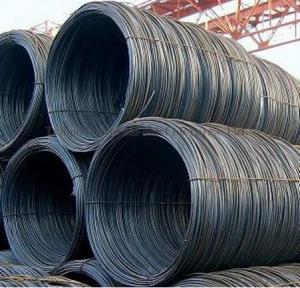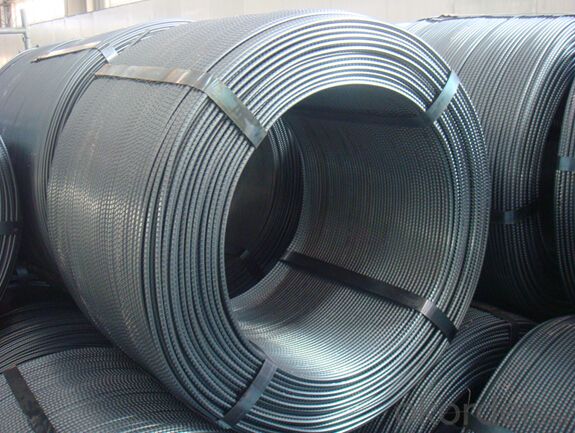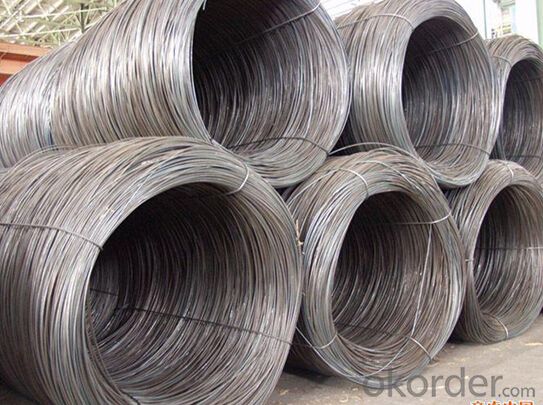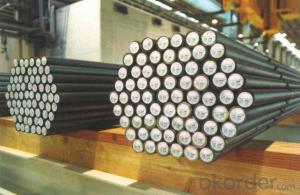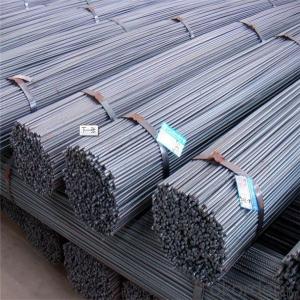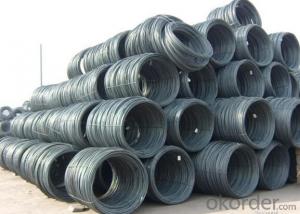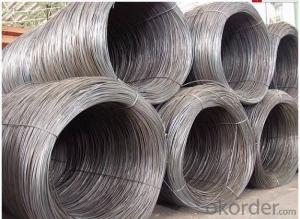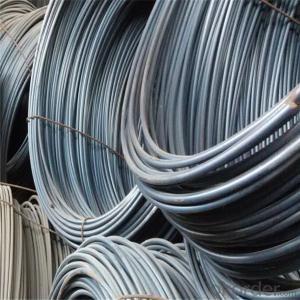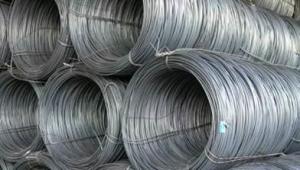HPB300 Building Wire Rod Price 6.5mm, 8mm ,10mm
- Loading Port:
- Tianjin
- Payment Terms:
- TT OR LC
- Min Order Qty:
- 3 m.t.
- Supply Capability:
- 10000 m.t./month
OKorder Service Pledge
Quality Product, Order Online Tracking, Timely Delivery
OKorder Financial Service
Credit Rating, Credit Services, Credit Purchasing
You Might Also Like
Specification
Type:
Carbon Steel,Spring Steel,Bearing Steel,Gear Steel,Deformed Steel,Stainless Steel,Alloy Steel
Shape:
Steel Coil,Steel Sheet,Steel Wire Rod,Steel Flat Bar,Steel Square Bar,Steel Angle,Steel Round Bar,Steel Billets
Technique:
Hot Rolled,Cold Rolled,Cold Drawn,ERW,Forged,Saw,Extruded,EFW,Spring
Surface Treatment:
Galvanized,Coated,Copper Coated,Color Coated,Oiled,Dry,Chromed Passivation,Polished,Bright,Black,PVDF Coated
Certification:
ISO,SGS,BV,IBR,RoHS,CE,API,BSI,UL
Thickness:
6.5mm-16mm
Width:
6.5mm-16mm
Length:
In coils
Outer Diameter:
6.5mm-16mm
Net Weight:
2m.t.
Packaging:
Seaworthy packaging
HPB300 Building Wire Rod Price 6.5mm, 8mm ,10mm
Detailed Information of the HPB300 Building Wire Rod Price 6.5mm, 8mm ,10mm
| Name | Hot Rolled High Carbon Wire Rod |
| Shape | Round Bar/Square Bar/Flat Bar/Plate/Wire |
| Standard | GB/ASTM/SAE/AISI/DIN/JIS/EN/BS |
| Surface Treatment: | Black/Peeling/Polished/Machined |
| Delivery Condition: | Hot Rolled or Forged/Peeled or Black Surface |
| Test | SGS/UT 100% Elements Testing |
| Certificate: | ISO/Mill Certificate |
| Service: | 24 hours online service / |
| more than 20 years trading and manufacture | |
| Quality Assurance: | the third party inspection, such as SGS, BV, TUV…etc. is acceptable |
| Packaging Details: | Seaworthy Packaging or as per customer's packing instruction |
Chemical Composition of the HPB300 Building Wire Rod Price 6.5mm, 8mm ,10mm
| Grade | Chemical Composition(%) | |||||
| C | Mn | Si | S | P | B | |
| SAE1008 | 0.1max. | 0.3~0.50 | 0.15max | 0.050max | ≤0.040 | >0.0008 |
| Mechanical properties | ||||||
| Yield strength(N/mm2) | Tensile strength(N/mm2) | Elongation(%) | ||||
| 250-280 | 350-380 | ≥32 | ||||
Company Introduction the HPB300 Building Wire Rod Price 6.5mm, 8mm ,10mm
CNBM International Corporation is the most import and export platform of CNBM group(China National Building Material Group Corporation) ,which is a state-owned enterprise, ranked in 270th of Fortune Global 500 in 2015.
With its advantages, CNBM International are mainly concentrate on Cement, Glass, Iron and Steel, Ceramics industries and devotes herself for supplying high quality series of refractories as well as technical consultancies and logistics solution.
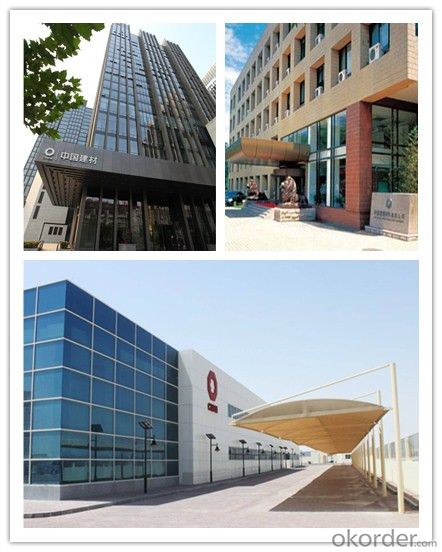
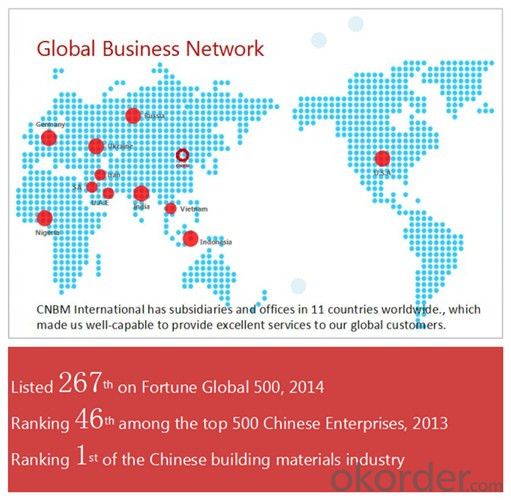
| After-sale service | CNBM provides the services and support you need for every step of our cooperation. We’re the business partners you can trust; you can relax and get on with doing business. |
| For any problem, please kindly contact us at any your convenient time, we’ll reply you in our first priority within 24 hours | |
| Advantages | Industry experience over 20 years. |
| Shipment of goods -More than 70 countries worldwide. | |
| The most convenient transport and prompt delivery. | |
| Competitive price with best service. | |
| High technical production line with top quality products. | |
| High reputation based on best quality products. |
Packaging & Delivery the HPB300 Building Wire Rod Price 6.5mm, 8mm ,10mm
| Packaging Detail | Sea worthy packing /as per customer's packing instruction |
| Delivery Detail | 15 ~ 40 days after receiving the deposit |
Products Show
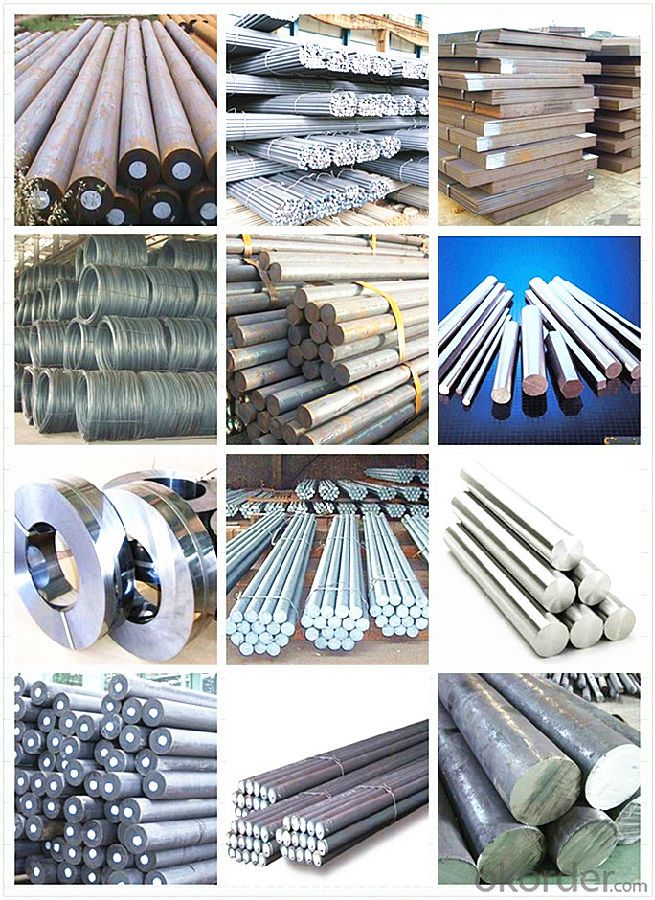
FAQ:
| Are you a trader or manufacturer? | Manufacturer |
| What’s the MOQ? | 3 metric ton |
| What’s your delivery time? | 15-35 days after downpayment received |
| Do you Accept OEM service? | Yes |
| what’s your delivery terms? | FOB/CFR/CIF |
| What's the Payment Terms? | 30% as deposit,70% before shipment by T/T |
| Western Union acceptable for small amount. | |
| L/C acceptable for large amount. | |
| Scrow ,Paybal,Alipay are also ok | |
| Why choose us? | Chose happens because of quality, then price, We can give you both. |
| Additionally, we can also offer professional products inquiry, products knowledge train (for agents), smooth goods delivery, excellent customer solution proposals. | |
| What's your available port of Shipment? | Main Port, China |
| What’s your featured services? | Our service formula: good quality+ good price+ good service=customer's trust |
| Where are your Market? | Covering more than 160 countries in the world |
- Q: How does special steel contribute to the aerospace aftermarket industry?
- Special steel plays a crucial role in the aerospace aftermarket industry by providing critical components that are essential for the safe and efficient operation of aircraft. The high strength, durability, and temperature resistance of special steel make it an ideal material for various aerospace applications. One of the primary ways special steel contributes to the aerospace aftermarket industry is through the production of engine components. Special steel alloys, such as nickel-based superalloys, are used to manufacture turbine blades, compressor discs, and shafts, which are vital elements of jet engines. These components must withstand extreme temperatures, pressures, and mechanical stresses, and special steel alloys offer the necessary properties to ensure reliable and long-lasting performance. Moreover, special steel is also used in the manufacturing of structural components in aircraft. Steel alloys with high strength-to-weight ratios, such as titanium alloys, are employed for the construction of critical parts like landing gear, wing spars, and fuselage frames. These components need to be both lightweight and strong to withstand the forces and stresses experienced during flight. Special steel alloys provide the required mechanical properties to ensure the structural integrity and safety of the aircraft. In addition to engine and structural components, special steel also contributes to the aerospace aftermarket industry through the production of fasteners, bearings, and other small yet vital parts. These components are responsible for holding various parts together and ensuring proper functioning of systems. Special steel alloys with excellent corrosion resistance, fatigue strength, and wear resistance are utilized to ensure the reliability and longevity of these critical components. Furthermore, special steel plays a crucial role in the maintenance, repair, and overhaul (MRO) activities of the aerospace aftermarket industry. With the rigorous demands placed on aircraft components, regular inspections, repairs, and replacements are necessary to ensure their continued airworthiness. Special steel materials are often used for MRO purposes due to their compatibility with existing aircraft systems and their ability to meet the stringent requirements of aerospace regulations. Overall, special steel is an indispensable material in the aerospace aftermarket industry. Its unique properties and characteristics enable the production of high-performance engine components, lightweight structural parts, and reliable small components. The use of special steel ensures the safety, efficiency, and longevity of aircraft, contributing to the overall success and growth of the aerospace aftermarket industry.
- Q: Can special steel be used in the manufacturing of household appliances?
- Certainly, household appliances can indeed be manufactured using special steel. Also known as alloy steel, special steel possesses a range of desirable attributes such as exceptional strength, durability, and resistance to both corrosion and wear. These characteristics render it suitable for a wide array of applications, including the production of household appliances. When it comes to household appliances like refrigerators, ovens, dishwashers, and washing machines, it is essential to utilize materials that can endure constant utilization, high temperatures, as well as exposure to water and chemicals. Special steel fulfills these requirements and provides a dependable and long-lasting solution. To exemplify, stainless steel represents a common type of special steel employed in household appliances due to its resistance to corrosion and hygienic properties. It finds application in various appliance components such as refrigerator doors, oven interiors, and dishwasher interiors. Stainless steel is easily cleaned, maintains its appearance over time, and does not react with food or other substances, making it an ideal selection for household appliances. Moreover, special steel alloys can be employed to enhance specific properties required in different appliances. For instance, heat-resistant alloys can be utilized in ovens or stovetops, while high-strength steel alloys can be employed in appliances necessitating structural integrity, such as washing machines or dryers. In conclusion, special steel can certainly find use in the manufacturing of household appliances. Its diverse properties, encompassing strength, durability, corrosion resistance, and versatility, make it a superb material choice for ensuring the performance, longevity, and safety of household appliances.
- Q: How does special steel contribute to the performance of cutting tools?
- Special steel plays a crucial role in enhancing the performance of cutting tools by providing a range of beneficial properties. Firstly, special steel used in cutting tool manufacturing offers exceptional hardness, which allows the tool to withstand high levels of stress and wear. This hardness ensures that the cutting edge remains sharp for a longer period, resulting in improved cutting efficiency and precision. Moreover, special steel is known for its excellent toughness and resistance to chipping and breaking. This property is crucial in cutting tools as it allows them to withstand the high forces and vibrations generated during the cutting process. The toughness of special steel ensures that the tool can endure these extreme conditions without compromising its performance or structural integrity. Additionally, special steel offers excellent heat resistance and temperature stability. During cutting operations, the tool can generate significant amounts of heat due to friction. Special steel's ability to resist thermal deformation and maintain its hardness at high temperatures prevents the cutting edge from becoming dull or losing its effectiveness. Furthermore, special steel can be tailored to specific applications through alloying and heat treatment processes. This flexibility allows manufacturers to optimize the steel's properties based on the cutting tool's intended use, such as cutting different materials or operating in challenging environments. By customizing the special steel, cutting tools can be designed to deliver optimum performance, durability, and longevity. In conclusion, special steel contributes significantly to the performance of cutting tools by providing exceptional hardness, toughness, heat resistance, and customization options. These properties ensure that cutting tools remain sharp, durable, and efficient, enabling them to achieve precise cuts and withstand demanding cutting operations.
- Q: What are the main applications of special steel in the mining exploration?
- Special steel is widely used in mining exploration due to its unique properties and strength. The main applications include the manufacturing of drill bits, drilling equipment, and machinery used in mining operations. Special steel's durability and resistance to wear and corrosion make it ideal for withstanding the harsh conditions encountered during mining exploration, ensuring efficient and reliable performance of equipment in this industry.
- Q: What are the different methods of machining special steel?
- There are several different methods of machining special steel, each with its own advantages and applications. Some of the most common methods include: 1. Turning: Turning is a machining process that involves rotating a workpiece while a cutting tool removes material from the surface. This method is typically used to create cylindrical shapes and can produce high-quality finishes. 2. Milling: Milling is a versatile machining method that uses rotary cutters to remove material from a workpiece. It can be used to create complex shapes and contours, and is often employed in the production of special steel components. 3. Drilling: Drilling is a machining process that involves creating holes in a workpiece using a rotating cutting tool. It can be used to create both through holes and blind holes in special steel, and is commonly used in various industries. 4. Grinding: Grinding is a precision machining method that uses an abrasive wheel to remove material from a workpiece's surface. It is often used to achieve tight tolerances and smooth finishes on special steel components. 5. Broaching: Broaching is a machining process that uses a sharp cutting tool with multiple teeth to remove material in a series of linear cuts. It is commonly used to create keyways, splines, and other intricate shapes in special steel. 6. Electrical Discharge Machining (EDM): EDM is a non-traditional machining method that uses electrical discharges to remove material from a workpiece. It is particularly useful for machining special steel with complex shapes or for creating small features. 7. Laser Cutting: Laser cutting utilizes a high-powered laser to cut through special steel with extreme precision. It is commonly used for intricate designs and can produce smooth edges without the need for subsequent processing. Each of these methods has its own advantages and limitations, and the choice of machining method depends on factors such as the desired outcome, the complexity of the part, and the properties of the special steel being machined.
- Q: Can special steel be used in cryogenic applications?
- Indeed, cryogenic applications can utilize special steel. In particular, austenitic stainless steels like 304 or 316 are frequently employed in cryogenic settings because of their remarkable mechanical attributes and ability to withstand low temperatures. These steels maintain their strength, toughness, and ductility even in exceedingly cold environments, rendering them suitable for cryogenic use. Furthermore, special steels also exhibit commendable resistance to corrosion and thermal expansion, which are crucial considerations in cryogenic applications. In summary, special steel alloys possess a distinctive combination of properties that make them highly suitable for withstanding and functioning in extremely frigid conditions.
- Q: How is corrosion-resistant steel used in marine environments?
- Corrosion-resistant steel is commonly used in marine environments due to its ability to withstand the harsh conditions of saltwater and prevent corrosion. It is utilized in the construction of ships, offshore platforms, and various marine structures. The steel's high resistance to corrosion prolongs the lifespan of these structures, ensuring their durability and safety in challenging marine environments.
- Q: What are the different methods of strengthening special steel?
- There are several methods of strengthening special steel, each with its own advantages and applications. One common method is through heat treatment, which involves heating the steel to a specific temperature and then cooling it rapidly or slowly, depending on the desired outcome. This can include processes like quenching, tempering, and annealing, which modify the microstructure of the steel to enhance its mechanical properties. Another method is alloying, where different elements are added to the steel to improve its strength. For example, adding elements like chromium, nickel, or molybdenum can increase the steel's resistance to corrosion, while elements like vanadium or tungsten can enhance its hardness and wear resistance. Cold working is another technique used to strengthen special steel, which involves deforming the steel at room temperature through processes like rolling, forging, or drawing. This helps to align the steel's crystalline structure, increasing its strength and hardness. Additionally, surface treatments can be applied to special steel to improve its strength. These can include techniques like carburizing, nitriding, or plating, which introduce a hardened layer or coating on the surface of the steel to enhance its wear resistance and durability. Each of these methods has its own advantages and can be tailored to suit specific applications and requirements. By combining various strengthening techniques, special steel can be customized to meet a wide range of industrial needs, making it a versatile and reliable material.
- Q: How does case-hardening steel achieve high surface hardness?
- Case-hardening steel achieves high surface hardness through a process called carburizing or nitriding, where the steel is heated in the presence of carbon or nitrogen-rich substances. This allows carbon or nitrogen atoms to diffuse into the surface of the steel, creating a hardened outer layer while maintaining a tough and ductile core.
- Q: How is special steel used in the production of cutting inserts?
- The unique properties of special steel make it the ideal choice for producing cutting inserts. Cutting inserts are utilized in machining operations to shape and remove material from a workpiece. These inserts must possess the ability to endure high temperatures, resist wear and abrasion, and maintain their sharp cutting edges for extended periods. Commonly referred to as tool steel, special steel is specifically engineered to meet these requirements. It is an alloy that incorporates a variety of elements like chromium, tungsten, vanadium, and molybdenum, which enhance its mechanical properties. With its exceptional hardness, toughness, and resistance to high temperatures, special steel is a suitable material for cutting inserts. To further augment its properties, the special steel employed in manufacturing cutting inserts undergoes a series of processes, including heat treatment. This process involves subjecting the steel to specific temperatures and rapidly cooling it, resulting in increased strength and hardness. By undergoing heat treatment, the cutting inserts become capable of withstanding the extreme forces and temperatures encountered during machining operations. Moreover, special steel can be coated with materials like titanium nitride or diamond-like carbon to enhance its performance. These coatings contribute to the hardness, friction reduction, and overall wear resistance of the cutting inserts, ultimately extending their lifespan and improving efficiency. In conclusion, special steel is selected for the production of cutting inserts due to its remarkable hardness, toughness, high-temperature resistance, and wear resistance. These properties enable the cutting inserts to withstand the demanding conditions of machining operations and retain their sharp cutting edges for prolonged periods. As a result, material removal is carried out efficiently and precisely.
Send your message to us
HPB300 Building Wire Rod Price 6.5mm, 8mm ,10mm
- Loading Port:
- Tianjin
- Payment Terms:
- TT OR LC
- Min Order Qty:
- 3 m.t.
- Supply Capability:
- 10000 m.t./month
OKorder Service Pledge
Quality Product, Order Online Tracking, Timely Delivery
OKorder Financial Service
Credit Rating, Credit Services, Credit Purchasing
Similar products
Hot products
Hot Searches
Related keywords
